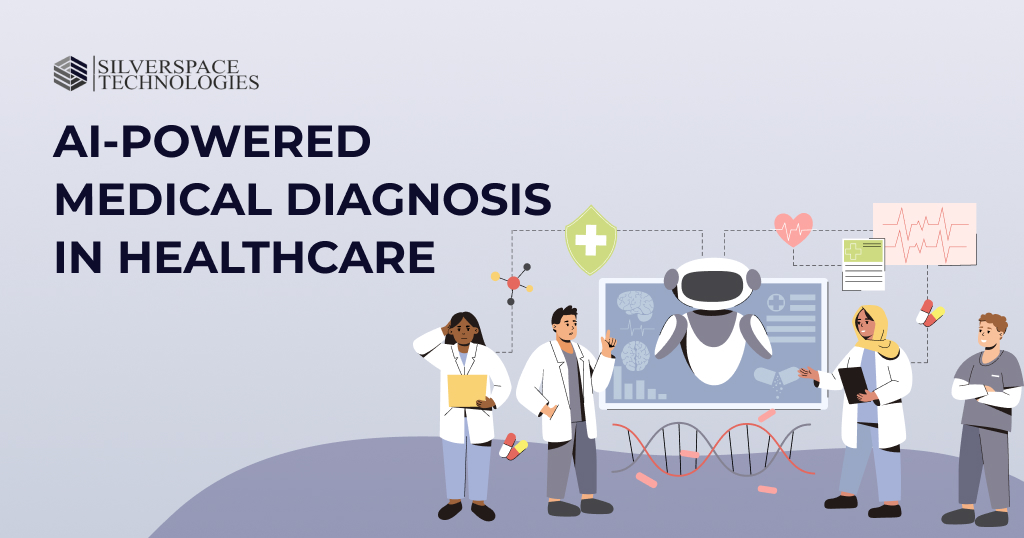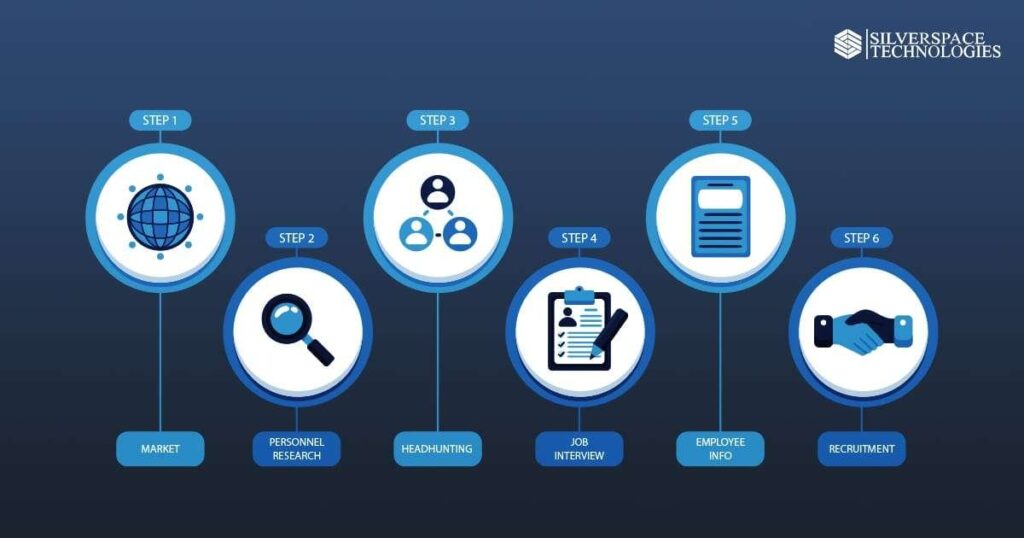
Introduction to AI in Healthcare
Artificial intelligence is one of the radical technologies that is changing many industries, not excluding healthcare. Silverspace Inc. is the leading IT solution company and is on the pipeline for new solutions that are going to revolutionize the healthcare sector in the development of AI integration. This technological advancement will manifoldly enhance improvement in the diagnostics of medicine. In this blog, let us delve into the benefits, applications, challenges, and future of AI in diagnosis for medicine.
Benefits of AI in Medical Diagnosis
Benefits of integrating artificial intelligence into healthcare:
More accuracy in diagnosis – AI-driven algorithms can analyze large amounts of data very fast and accurately, hence reducing the errors occurring due to human bias.
Efficiency: AI speeds the diagnostic process, allows more patient care, and eases the workload on medical professionals.
Personalized Treatment Plans: AI can analyze patient data, which subsequently permits the development of person-specific treatment plans; this ideally maximizes the outcomes.
AI Applications in Healthcare
Medical Imaging Analysis
The use of AI in the analysis of medical images has transformed how radiologists and other specialists interpret medical images. This happens due to a very high recognition of anomalies through algorithms in X-rays, MRIs, and CT scans, which a human eye might miss. Early diagnosis is key, particularly for ailments like cancer, where early-stage detection dramatically improves patient survival rates.
Predictive analytics
The same predictive analytics is being made use of in healthcare too, where AI gets to predict patient outcomes and potential risks in health. Historical patient data can be analyzed to identify patterns, while AI can be carried out with early intervention from the healthcare provider to keep those complications at bay. For example, it could make predictions as to which patients are about to develop chronic diseases, such as diabetes or heart disease, to be acted upon promptly.
Personalized Medicine
Personalized medicine, driven by AI, develops a tailor-made treatment approach to healthcare with individual patient data. It helps in analyzing genetic, environmental, and lifestyle data to determine the proper treatment plans for the patients. That promises the effectiveness of treatment, yet, at the same time, the treatment will be individualized to get maximal desired effects and eliminate unwanted outcomes.
Telemedicine and Virtual Care
AI is now also improving virtual care and telemedicine. Chatbots or AI assistants that carry out preliminary consultations, if paired with them, can answer patients’ questions and, in some instances, even enable appointments to be scheduled. This enhances accessibility to healthcare services and simultaneously lessens the workload on health professionals, hence allowing them to dedicate their efforts to more critical tasks.
Drug Discovery and Clinical Trials
AI is speeding up the very complex process of drug discovery and clinical trials. By analyzing huge datasets, AI can point out possible drug candidates much faster and more precisely. In clinical trials, it may optimize the selection of patients, follow up on trials in real-time, and optimize analysis towards an expedited and efficient flow, thus reducing the time and cost of new drug entry into the market.
Challenges in AI Adoption
Despite the many perceived benefits of AI, healthcare has some potential challenges associated with the adoption of AI:
Data privacy and security: Ensuring the security of patient data and maintaining privacy.
Integration into existing systems: Integrating AI solutions with already existing healthcare infrastructure can be highly complex and costly.
High-Quality Data: The AI algorithms need massive quantities of high-quality data to produce effective deployment results, which can also be a limiting factor in the healthcare sphere.
Regulatory and Ethical Considerations: AI in healthcare has raised many regulatory and ethical issues, especially those related to decision-making in patient care.
How AI Is Changing The Future of Health Care
The future of artificial intelligence in healthcare is bright, with continuous innovations that promise to further revolutionize the industry.
Key trends to watch for include the following:
Enhanced Algorithms: AI algorithms will continue to improve, thus enhancing their precision and robustness.
Integration into the Internet of Things: AI integrated with the Internet of Things will, therefore, result in real-time monitoring and analysis of patient data, thus bringing in more proactive healthcare.
Better Interoperability of Data: Efforts are made to increase interoperability in data—this will enhance the usability of AI across platforms in healthcare systems.
Preventive care: AI will be at the center of repositioning healthcare from interventionist to early intervention, with significant investments focused on wellness.
We, at Silverspace Inc., are trying to push these limitations and develop highly innovative AI solutions applied in health, which would provide better patient outcomes, lower healthcare delivery costs, and increase overall efficiency.
Conclusion
AI-powered medical diagnosis is shifting health and conferring enormous benefits toward accuracy, efficiency, and individualization of care. When meeting the existing challenges and exploiting the potentials of AI to ensure a healthier future for all, Silverspace Inc. aims to lead this transformation through AI to offer state-of-the-art IT solutions in the healthcare sector.

